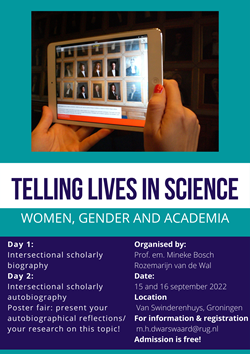Conference - Telling Lives in Science: Reflections on Scholarly (auto)Biography
Conference in celebration of the PhD ceremony of Rozemarijn van de Wal and the Farewell lecture of Mineke Bosch
What does it mean to be a scholar? And how can we tell our own or other lives in science? There exists a rich tradition of (auto)biographical narratives written by and about scholars, but these narratives have often disregarded or barely mentioned the role of gender or any other category of in and exclusion. Biographers did that, stressing their conviction that science is beyond the social, or that ‘the mind has no sex’, no colour, no class. For a long time, when writing their autobiographies, scholars and scientists reproduced those convictions. Indeed, one of the most common autobiographical ‘acts’ or ‘performances’ by women scholars, was to fashion themselves as ‘scientists’ as opposed to ‘women’, thereby giving off the impression that gender does not play a role in the male dominated world of academia.
Academic feminism of the 1960s and 1970s radically changed people’s perceptions. Following Alice Rossi’s question ‘Why so few?’ women’s and gender studies began to research the role of women and gender in science and academia. In the 1980s, Kimberlée Crenshaw’s concept of intersectionality expanded our intellectual toolkit and brought awareness to the many categories of difference that play a role in the white, masculine, elitist domain of science and academia, including class, ethnicity and sexuality. Since then, scholars have explored the ‘struggles and strategies’ (to cite Margaret Rossiter’s seminal study of American women scientists), that non-standard scholars faced, as well as the repertoires that they utilized in order to lay claim to authority and credibility.
In the modern history chair at the University Groningen, research into the question of how and why scientists and scholars did succeed in academia and science (or not) was inspired by the concept of scientific or scholarly persona, or the performance of a convincing and trustworthy scholarly or scientific identity at the intersection of personal and professional lives. In this research, biography and autobiography play pivotal roles.
Programme
Thursday 15 September: Intersectional Scholarly Biography
On 15 September, we address the question of how to write the biography of a scholar or a scientist. Focussing specifically on the concept of scholarly or scientific persona, biographers examine the complex interplay between academics, their scholarship and the ways in which they lay claim to authority and credibility through the fashioning of a trustworthy self. How do scholars negotiate their multifaceted identities as racialized, classed and gendered people? How can we research and write their lives? What sources are available to study their scholarly identities? And how did their performances contribute to Cor perhaps hindered) their academic success?
Keynote speakers are: Laura carter (GB), Thomas Etzemüller, (BRDKirsti Niskanen (SE), ), Kaat Wils (BE), Meritxell Simon-Martin (SP)
This day ends with the defence ceremony of Rozemarijn van de Wal’s dissertation Dancing in the Kitchens of History. Eileen Power (1889-1940).
Please note: all indicated times are including room for questions/discussion
- 09.30: Welcome with coffee & tea
- 10.00-10.45: Thomas Etzemuller keynote I
- 10.45-11.15: Kaat Wils
- 11.15-11.30: Break
- 11.30-12.00: Kirsti Niskanen
- 12.00-12.45: Meritxell Simon-Martin Keynote II
- 12.45-13.45: Lunch break (included)
- 13.45-14.15: Laura Carter
- 14.15-14.45: Layman’s talk Rozemarijn (Dutch)
- 14.45-16.00: Break
- 16.15: Defence ceremony Rozemarijn (English)
- 18.00-19.00: Reception at Schimmelpenninckhuys
Friday 16 September: Intersectional Feminist/Scholarly Autobiography
On Friday 16 September we turn the lens to feminist scholarship in historical and women’s and gender studies departments and beyond. How did feminists become scholars, or the other way around? What have been our struggles and strategies, or the repertoires of identity that we used to? Did or do we perform our ‘authentic feminist selves’ at the same time as doing our professional jobs? Did or do we hide our (political) feminist convictions behind the mask of the impartial professional historian? We invite all feminist scholars (including those who do not necessarily identify as feminist) to engage in autobiographical reflection and tell how they have shaped their lives as black, white, gay, feminist, women and men in (or perhaps outside) the world of academia, to survive and thrive and perhaps in the end, to change the world.
Please note: all indicated times are including room for questions/discussion
- 09.15-09.30: Coffee & tea
- 09.30-09.45: Welcome
- 09.45-10.00: Short talk Thony Visser
- 10.00-11.15: Gloria Wekker & Jonas Roelens (English)
- 11.15-11.30: Break
- 11.30-12.45: Fransisca de Haan & Rosemarie Buikema (English)
- 12.45-13.30: Lunch (included) and poster fair
- 13.30-15.00: Poster fair soapbox pitches (Dutch)
- 15.00-16.00: Break
- 16.00-17.00: Farewell lecture Mineke at doopsgezinde kerk
- 17.00-18.00: Reception
Call for posters
In the afternoon of day two of the conference, we will organise a poster fair where scholars can present their autobiographical reflections or research through an academic poster. (Some) poster presenters will also be invited to climb on the proverbial soapbox to pitch their research or to share a story/memory/anecdote or even to discuss an object about what it means to be an intersectional feminist scholar.
We invite everyone who is interested in making a poster to send an e-mail to Marieke Dwarswaard who will then send you a very easy to follow digital manual on how to make a poster. Deadline for the poster is Monday September 12, they will be printed in Groningen and exposed at the poster fair (m.h.dwarswaard@rug.nl)
Registration
Participating/attending is free.

